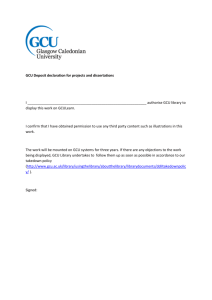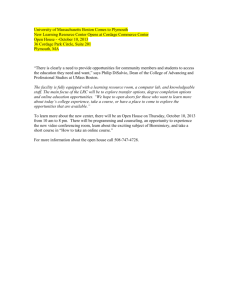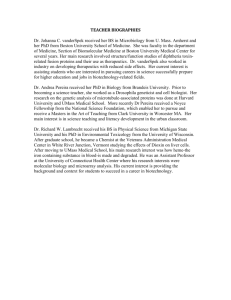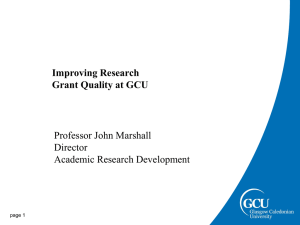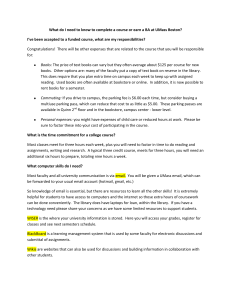Using science learning partnerships
advertisement
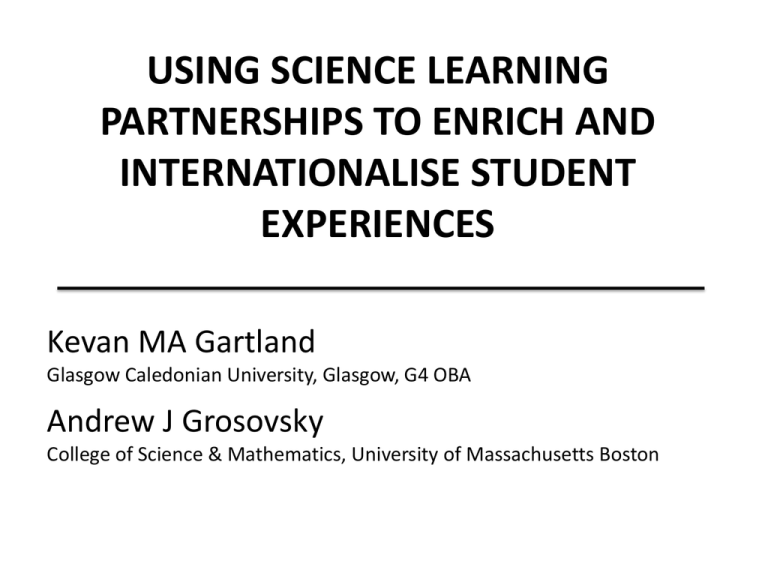
USING SCIENCE LEARNING PARTNERSHIPS TO ENRICH AND INTERNATIONALISE STUDENT EXPERIENCES Kevan MA Gartland Glasgow Caledonian University, Glasgow, G4 OBA Andrew J Grosovsky College of Science & Mathematics, University of Massachusetts Boston International Science Learning Partnership ‘A Mission to Mars!’ Glasgow Caledonian University & University of Massachusetts Boston International Partnership: Innovation, Scale, and Impact Since 2010, UMass Boston and GCU successfully developed and implemented an innovative exchange program with several distinctive elements: • • • Inclusion of first-year students in their first semester Involvement of communities, which permitted the exchange experience to be extended to all members, with great relevance for early academic engagement Rich involvement of students, faculty, and staff members from both universities, who grew together as a team of colleagues UMass Boston Student Success Strategy • Established Student Success Center in 2008, • Data-driven and student-centered philosophy • Custom designed and implemented student success programs that address the specific needs of first year students • An “outreach” model for academic advising and academic support • Academically centered learning communities Freshman Success Communities (FSC) has promoted strong faculty participation, supplemental Instruction and peer mentors for students • The Curriculum includes a Science Gateway Seminar in which the students collaborated on research assignments using Wikis, which facilitated collaboration and inclusion of GCU students UMass Boston Student Success Outcomes CSM has successfully achieved scalability of our approach without diminishment of impact on retention. Freshman Success Community (FSC): Scalability Number of Communities Number of Students Percentage CSM Freshmen 2009-2010 2 46 16% 2010-2011 6 123 38% 2011-2012 7 144 42% 2012-2013 12 211 51% Freshman Success Community (FSC): Retention Impact FSC Non FSC Total CSM UMass Boston Retention 2010 86% 70% 73% 75% Retention 2011 83% 71% 76% 75% Retention 2012 89% 79% 83% 79% Science Learning Partnership: Aims • • • • • • Enhance international collaboration in science education Increase student engagement in research activities Promote learning community model Encourage the use of negotiated blended learning approaches Integrate social inclusion into first year science curriculum Expose students to different cultures Science Learning Partnership: Mission to Mars! 2011-12: Pilot year-focus on premedical and biosciences • • • Support from Prime Minister’s Initiative/British Council Award, funding from Davis Educational Foundation (US) and generous contribution from Mr. Art Mabbett Involved 40 Level 1 undergraduate and 3 postgraduate life sciences students from GCU and UMass Boston Introduced UMass Boston College of Science and Mathematics Freshman Success Communities (CSM FSC)model 2012-13: Focus expanded to include chemistry, computer science, electrical engineering • • Support from Scottish Government Saltire Scholarships for Outward Student Mobility, CSM institutional funds and generous contribution from Mr. Art Mabbett Expanded to 98 Level 1 undergraduate students from GCU and UMass Boston Science Learning Partnership: Community Establishment: • • • Introductory “meet and greet” videos, supplemented by blogs and social media Weekly community tutorials and informal networking progressed tasks addressing ‘Hot Science Topics’ including: Stem Cell Cloning, Personalized Medicine, Environmental Toxicology Students presented their findings by WebCast and as part of modular assessments Community and Role Development: • • • Freshman Success Communities were set up with joint task teams of travelling, hosting, communications and academic support students Student teams worked together to prepare for the visits, such as planning and executing cultural activities and providing support for travellers All students continued to contribute to making the innovative ‘Mission to Mars’ successful, whether travelling or hosting, emphasising the team nature of collaborative science Science Learning Partnership: Visit Activities Student Selection: • Interested students were required to prepare short Wikis, video or social media tools on why they should be chosen to be ‘travellers’ for the physical exchanges • Travellers were selected based on agreed selection criteria by interviews and peer reviews Visit: • Groups of up to six students travelled independently to the partner city for one week to follow a vigorous academic and social schedule. • Programs included lectures, environmental field trips, laboratory sessions, and student programmed robotic workshops complemented by cultural and social activities. • Knowledge development visits to key life sciences companies and institutes provided further learning engagements Science Learning Partnership: Sample Wiki Page 1 Science Learning Partnership: Sample Wiki Page 2 Science Learning Partnership: Sample Wiki Page 3 Science Learning Partnership: Student Evaluations Students said: ‘An inspirational and life changing experience!’ ‘A fantastic experience - an amazing array of lessons learned’ ‘Increased my understanding of international education’ ‘Has completely changed my life. I now don’t fear making a big change and am much more confident’ Science Learning Partnership: Student Evaluations Participating in the International Learning Partnership: Helped me develop independent study skills Helped me become more independent and self-reliant Increased my understanding of other cultures Increased my understanding of international science collaborations Made me think about joining future international exchanges Helped me with the transition to University life Gave me the opportunity to develop intercultural skills Gave me confidence in communicating and interacting with students Gave me confidence in communicating and interacting with staff Introduced me to new technologies Percentage of Students Agreeing 2013 Sem 2 UMB 2013 Sem 2 UMB PreMed CompEng 2012 Sem 1 UMB PreMed 2012 Sem 1 GCU Bio 2013 Sem 2 GCU Bio 2013 Sem 2 GCU Comp 75 89 44 49 83 64 70 100 51 42 100 82 100 100 85 85 100 91 90 89 54 55 75 82 100 100 85 82 100 100 80 100 28 40 67 64 100 89 80 75 100 91 100 100 87 77 92 82 95 100 69 69 100 82 85 100 47 55 92 55 Science Learning Partnership: Student Outcomes • • • • • Stronger independent learners with increased self-confidence Gained international scientific perspectives Improved research & presentation skills Greater motivation to acquire and use knowledge UMass Boston data suggests <10% progression increment due to Freshmen Success Communities, similarly, initial GCU data suggests a similar Level 1 Progression increment for participants • Partnership veterans are already actively engaged in planning and mentoring their successors, continuing the community for future exchanges • Institutional commitments to shared mission: successful transition into university learning Thanks to: Prime Minister’s Initiative Award, British Council Scottish Government Research & International Team Lord Provost, City of Glasgow Davis Educational Foundation (US) Mr. Art Mabbett, President, Mabbett & Associates Students and Colleagues at UMass Boston and GCU Watch an evaluative video at: http://www.youtube.com/watch?v=i1S_Ad8Vijk&noredirect=1
